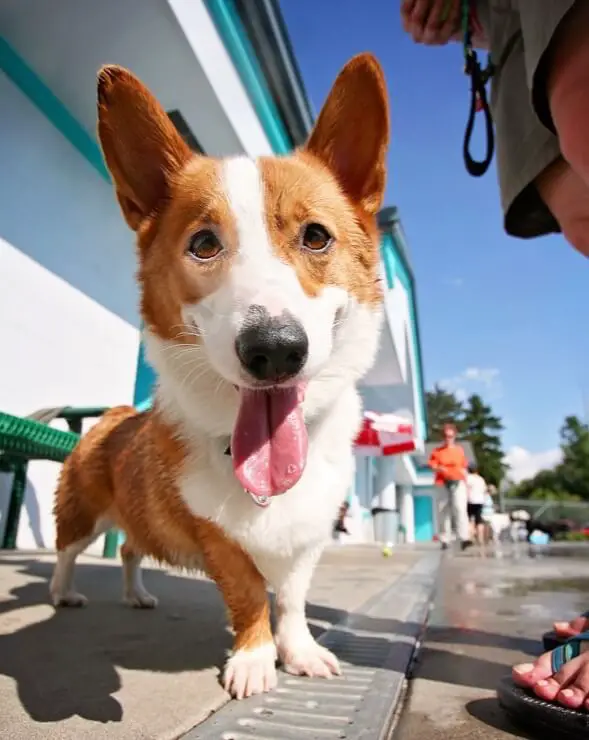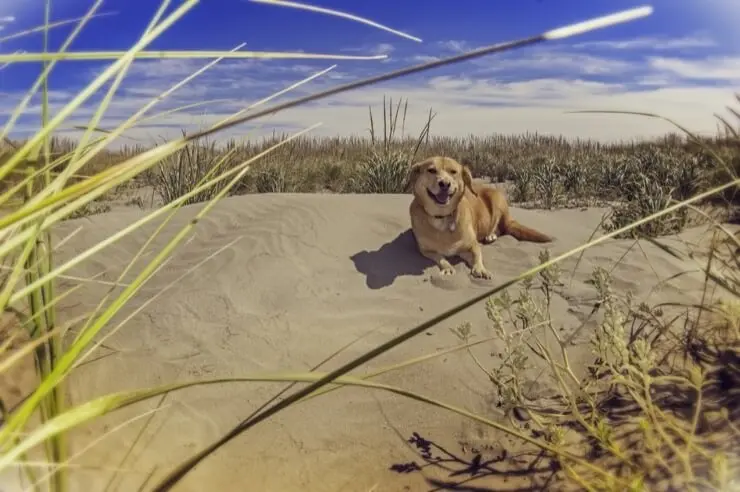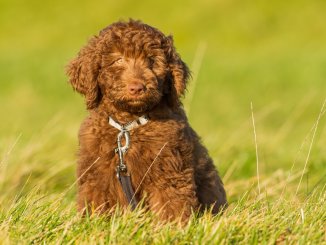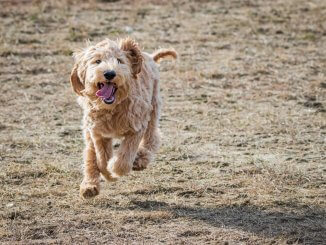The corgi lab mix is a cross between a Welsh corgi and a Labrador retriever. Corgi lab mixes are also commonly referred to as corgidors, lab corgi mixes, and corgi labs.
Corgi lab mixes are energetic dogs that love swimming and need plenty of exercise, preferably alongside active owners. This crossbreed ranges in height and weight, depending on which parent the puppy takes after. Generally, they are 10–24 inches tall and weigh 30–60 pounds.
These dogs are even-tempered and make good guard dogs because of their frequent barking to alert their owners of changes in the environment. They have a life expectancy of 10–14 years.
Corgi lab mixes typically cost between $70 and $1,500.
TABLE OF CONTENTS
Corgi Lab Mix Characteristics & Overview
| Common names: | Corgi lab mix, corgidor, corgi lab, lab corgi mix |
| Origin: | Unknown |
| Parent breeds: | Welsh corgi and Labrador retriever |
| Breed group: | Hybrid |
| Size: | Medium |
| Height: | 10–24 inches |
| Weight: | 30–60 pounds |
| Colors: | Black, chocolate, tan, red, yellow, fawn, or tricolor |
| Coat: | Dense, straight coat, short to medium-length |
| Life expectancy: | 10–14 years |
| Temperament: | Playful, friendly, spirited, affectionate, and energetic |
| Shedding: | Moderate to heavy |
| Barking tendency: | Highly vocal |
| Cost: | $700–$1,500 |
Origin & Purpose
The origin of corgi lab mixes is relatively unknown and the reason for the crossbreeding isn’t clear. However, it is believed that the corgi lab mix was bred in the early 1900s for herding and farming purposes, as both parent breeds are known to be hard workers.
The corgi lab mix breed is not officially recognized by the American Kennel Club (AKC) because of its unknown history, which means there are no true breed standards for the corgidor.
Welsh Corgi Parents
There are two types of Welsh corgis — the Pembroke Welsh corgi and the Cardigan Welsh corgi. Either one of these corgi breeds can parent a corgidor, along with a Labrador, and the type of corgi will affect the size and personality of the puppy.
The Cardigan Welsh corgi has larger ear flaps, smaller eyes, and is taller than the Pembroke Welsh corgi. The Pembroke Welsh corgi is smaller, lighter, and quieter.
Both types of Welsh corgis are hardworking, affectionate, and protective, with short legs and a thick, often multi-colored coat that is passed down to the corgi lab mix.
Labrador Retriever Parents
The Labrador originated from water dogs in Newfoundland and has a hard-working, playful, and affectionate nature, which can be seen in the corgi lab mix. Much like the corgi, Labs have a thick double coat that causes them to shed often, which is also passed down to the corgidor.
Labrador retrievers are highly energetic and love the water, and both of these traits are usually found in the corgi lab mix.
Life Expectancy
Corgi lab mixes have a general life expectancy of 10–14 years when healthy and well cared for. Give these dogs plenty of exercise and a high-quality, healthy diet to prevent health issues.
Common health issues — such as diabetes, spinal issues, and obesity — may shorten the lifespan of corgi lab mixes.
Corgi Lab Mix Appearance

Corgi lab mixes vary in size, appearance, and color based on the appearance of the parents. Generally, they appear similar to Labs in their wide head and body shape, but they have the short legs of a corgi.
Corgi lab mixes either have a short tail from the corgi parent or the longer, tapered tail of the Lab parent.
Height and Weight
Corgi lab mixes are considered medium dogs, with a height at the withers of 10–24 inches, and a weight of 30–60 pounds. Their size depends on the size of their parents as well as which parent’s genes the puppy favors.
They are usually taller when the corgi parent is a Cardigan Welsh corgi or when the puppy inherits its size from the Lab parent.
Corgi lab mixes have a varied weight range, which also depends on which parent the puppy takes after and whether the corgi parent is a lighter Pembroke Welsh corgi, or a heavier Cardigan Welsh corgi.
Colors
Corgi lab mixes are typically black, brown, red, or fawn. The coat of this breed can either be a solid color from the Lab heritage or the coat can have mixed colors from the corgi heritage.
The coat colors will usually vary within a litter because there is no set standard for this breed.
Coat
Corgi lab mixes have a double coat made up of a dense topcoat that protects them from the cold and a thick, water-resistant undercoat. The topcoat is short to medium length and the undercoat is dense.
The length of the coat varies between short and medium and the appearance can be straight or wiry depending on the parents.
Because both parent breeds are heavy shedders, the corgi lab mix sheds heavily throughout the year with an increase during the shedding seasons in spring and autumn.
Body Shape and Leg Size
Corgi lab mixes have a longer body length than height, which they inherit from the corgi parent. The shorter legs are due to a trait known as chondrodysplasia, or canine dwarfism, which can cause health issues like back and spinal problems.
Personality and Temperament

Corgi lab mixes are highly protective of their families and affectionate and lovable to those they know and trust. Their protective nature, warning bark, and nipping tendency come from the corgi parent, as corgis are known to be bold, alert, and loyal.
The labrador retriever parent is responsible for the lovable, affectionate, and adaptable nature of this mixed breed.
Corgi lab mixes are suited to families with children because the loving and intelligent nature of both parent breeds creates a patient and affectionate dog that is highly protective when needed.
These dogs are also energetic — a trait from both breeds — so they need an active family to give them enough exercise.
Barking
Corgi lab mixes are excessive barkers, especially when they think their family is in danger or when they want to alert their owners of something. While Labrador retrievers are quiet dogs that rarely bark, the corgi lab mix adopts the barking from its corgi parent.
Early socialization can minimize these barking tendencies, although it is a characteristic that will always remain with the breed due to its protective nature.
Corgi Lab Mix Care

Corgi lab mixes are generally easy to care for and need minimal grooming, although they do shed a lot.
They also need a well-monitored diet and plenty of exercise to prevent bad behavior and to keep the dog healthy.
Food Needs
Corgi lab mixes have a healthy appetite and need three cups of high-quality dry dog food per day. The food should be specifically formulated for medium-sized dogs with moderate to high energy.
These dogs can easily become obese because of their small size and tendency to overeat. To prevent obesity, feed a corgi lab mix two meals per day and limit the number of treats given.
Grooming Needs
A corgi lab mix sheds heavily throughout the year, requiring a brush at least once or twice a week to remove the dead hairs from its coat.
Bathe this breed every five to eight weeks unless it is a frequent swimmer, in which case you should bathe it more often to keep its coat clean.
Brush their teeth daily or weekly and regularly check their ears for signs of infection. The corgi lab mix’s nails should be trimmed every three weeks unless they have already been worn down from running or walking on hard surfaces.
Exercise Needs
Both parent breeds are highly energetic dogs that need an abundance of exercise every day. The corgi lab mix requires just as much exercise, which can be given through a half-hour to an hour walk as well as a few play sessions or swims throughout the day.
These dogs are suitable for smaller apartments without a yard, as long as they are taken to a park daily for a walk and their play sessions.
Mental Needs
The corgi lab mix requires mental stimulation each day to prevent it from becoming destructive.
Task-orientated play will keep the dogs stimulated when left alone. Herding events or games work well because of the corgi’s history of working as a herder.
Common Health Concerns
Corgi lab mixes are generally healthy dogs, although the crossbreed may develop health problems that are common in both corgis and Labradors, making them susceptible to certain illnesses.
Poor grooming habits and diet can also cause health problems.
Look out for the following health conditions in corgi lab mixes:
- Hip and Elbow Dysplasia: occurs when the hip or elbow joint doesn’t develop correctly, which can be genetic or caused by an improper diet. Dysplasia causes a limp and has no treatment, but can be managed with a good diet, exercise, and rehabilitation.
- Diabetes: caused by an imbalance in the dogs’ insulin levels, the symptoms of this disease include excessive thirst and hunger, weight loss, and increased urination. After a veterinarian has assessed the dog, the vet may recommend dietary and exercise changes as well as injections to manage the disease.
- Intervertebral Disk Disease (IVDD): occurs when the soft discs between the corgi lab mix’s spine are inflamed or slip out of place, causing pain and pressure. Symptoms of IVDD include the inability to jump up stairs, a curved back, or refusal to eat. IVDD can be treated with rest and medication, or surgery in severe cases.
- Heart disease: caused by genetic or lifestyle issues. Several types of heart diseases can affect corgi lab mixes, such as tricuspid valve dysplasia and congestive heart failure. These conditions need to be diagnosed and treated by a veterinarian.
- Cancers: occur due to genetic or lifestyle reasons. Various types of cancers can affect Labradors and corgis, which can be passed down to a corgi lab mix. These cancers include osteosarcoma, lymphoma, and skin cancer.
Training

Both parents of this mixed breed are breeds that are intelligent and eager to please, making the corgi lab mix easy to train. Some corgi lab mixes can be stubborn because of the corgi’s heritage, although early obedience training with positive reinforcement methods will help overcome this.
Corgis are highly protective and prone to biting moving objects and people — traits that can be passed down to a corgi lab mix. Early socialization with different visitors, children, and pets is essential to teach these dogs to stay friendly around visitors and young children.
Corgi Lab Mix Price
Corgi lab mixes are relatively cheap dogs to buy and don’t have any expensive specialized care needs. Adopting an adult will be cheaper than buying from a breeder, as puppies are generally more expensive than adults.
How Much is a Corgi Lab Mix?
A corgi lab mix typically costs $700 to $1,500. Adopting will cost between $100 to $500, depending on the rescue center. Adults from adoption centers cost less than puppies.
How Much Does it Cost to Own a Corgi Lab Mix?
Corgi lab mixes are relatively cheap to look after because they don’t eat as much as larger dogs and don’t have many grooming requirements.
The first year of care will cost roughly $3,000–$3,500, and thereafter about $1,500–$2,000 per year.
Is This Mixed Breed Right for You?
Corgi lab mixes offer affection, playfulness, and a highly protective nature to experienced or first-time dog owners. However, some personality and physical traits of this mix may not be suitable for all owners.
Who Should Get a Corgi Lab Mix?
Corgi lab mixes are well-suited for active families with children of any age as long as the dog is socialized with children from a young age to prevent biting. They can accompany a family with pets or an individual owner looking for an affectionate and lovable pet that also has guarding instincts to help protect the home.
These dogs are suitable for small apartments or houses with large yards as long as they’re given plenty of exercise and play sessions each day. They are independent and are happy to be left alone for a few hours at a time.
Who Should Not Get a Corgi Lab Mix?
Corgi lab mixes are heavy shedders and do not suit owners who are allergic or don’t like pet hair all over the house. These dogs are also loud and avid barkers and do not suit apartments or living areas where there are neighbors close by.
They need lots of exercise and do not suit inactive owners who don’t have the time or energy to walk them and give them multiple play sessions each day.
More Pembroke Welsh Corgi and Labrador Retriever Mixes
Want a Pembroke Welsh corgi mix or Labrador retriever mix but aren’t keen on the corgi lab mix? Check out these other hybrid dog breeds:
Pembroke Welsh Corgi Mixes
- Corgi German Shepherd Mix
- Corgi Shiba Inu Mix
- Pitbull Corgi Mix
- Corgi Husky Mix
- Golden Retriever Corgi Mix











Be the first to comment